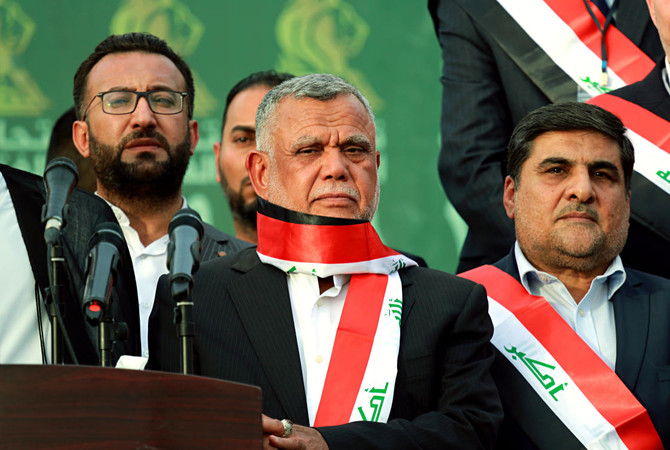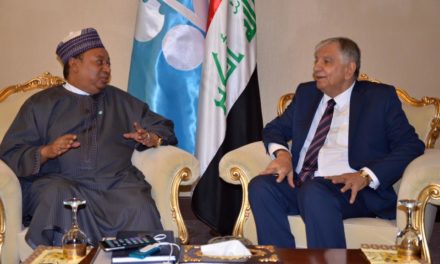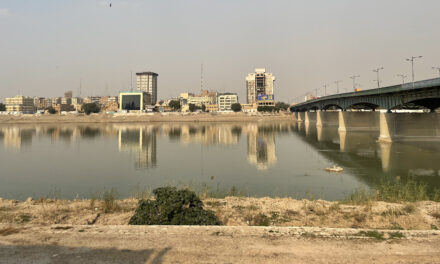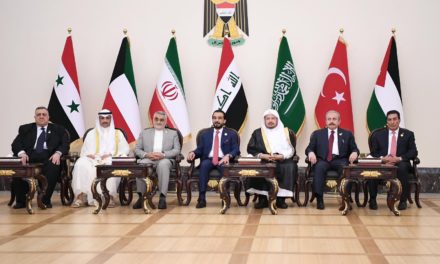(Hadi Al-Ameri attends a campaign rally in Baghdad on May 7, 2018. Photo: AP)
This week saw the breakup of one of Iraq’s major political parties. A large group of members from Badr Organization, calling themselves the “Patriotic Badr Movement” (Badr Al-Wataniya) announced that they split from the Badr Organization, led by Hadi Al-Ameri. Many in Badr felt discontent with the direction Al-Ameri was leading the party and his political allies. In a statement distributed to the media, the new movement expressed its wishes to “achieve democratic transformation and reform the deteriorated organization and political reality of Badr.”
Badr Al-Wataniya also expressed in the statement its discontent with the current leadership in “failing to preserve the legacy of the martyrs, achieving the interests of the country, and fulfilling the ambitions of the people and their hopes, not to mention those of its own members.” Specifically, the new movement seemed to be frustrated with the authoritarian style of Badr’s leadership, vowing to “dismiss and hold the current leadership accountable for putting its hand in that of the killers of the Iraqi people.”
Externally, former Prime Minister Nouri Al-Maliki and Qais Al-Khazali in the Bina’a coalition felt that Al-Ameri was leaning too closely towards Muqtada Al-Sadr, leading to internal disputes. The two major coalition blocs, Bina’a and Islah have not been able to agree upon the remaining ministerial posts in Prime Minister Adil Abd Al-Mahdi’s government and it is clear that agreements are hard to come by from the two major coalitions, when there are political rifts within the coalitions and within the parties themselves.
This is not the first time a major political party splits, in fact party breakups happen often in Iraq. Outside the Islamic Dawa Party, the Communist Party of Iraq and the Kurdistan Democratic Party, most of Iraq’s political parties have been formed by the splintering of another party. Ammar Al-Hakim’s National Wisdom Movement (Hikma) split from the Islamic Council of Iraq (ISCI) in 2017. ISCI itself split from the Islamic Party of Dawa back in 1982. Badr Organization, formerly the military wing of ISCI, became independent and formed its own political party in the aftermath of the 2003 Iraq War. Now, Badr is experiencing internal division of its own.
Even established political parties that have cult leaderships such as Muqtada Al-Sadr’s Sadrist Movement and Massoud Barzani’s Kurdistan Democratic Party (KDP) have seen branches of their party’s break off at one point. The Patriotic Union of Kurdistan (PUK) is an offshoot of the KDP formed in 1975 by the late Jalal Talabani and Gorran is an offshoot of the PUK formed in 2009 by the late Nawshirwan Mustafa. The creation of Asaib Ahl Al-Haq in 2006, led by Qais Al-Khazali, is an offshoot from the Sadrist Movement, which saw division early in its political existence.
Iraqi analyst Muhammad Al-Waeli claims that because voters in elections are driven by populist rhetoric rather than focus on performance of those they are voting for, the environment which forces parties to create a leader with explicit policies is nonexistent. Waeli also argues that political parties need to be platforms where leadership is meant to develop, but that is only possible when parties have policies cemented in place. Political parties fail to produce real leaders, which is the reason why Iraq struggles to produce a Prime Minister with a clear-cut vision.
The lack of a vision driven by a platform in all the political parties is the catalyst behind the political chaos ensuing today. The main winners of the 2018 May election have been able to agree on one thing only and that was to remove former Prime Minister Haider Al-Abadi from office and little else. It has been a struggle for Abd Al-Mahdi from day one, trying to have enough ministers voted in by parliament to form a government because of little agreement from the parties on the candidates proposed. It has been over 100 days now since Abd Al-Mahdi’s government was formed and it remains incomplete because of disputes over candidates for the posts of Minister of Defence and Interior. If political parties had visions laid out and could agree on similarities they shared rather than clash over spoils of government positions, there would be less of a toxic environment in Iraqi politics and citizens would see more action than talk from their elected officials.
These political conflicts not only expose Iraq to security risks today but also add another reason for citizens to protest their government come summer time when patience historically runs out amongst Iraqis. Politically, it seems that enough parliamentarians are breaking off from Ameri that it should not affect the Bina’a coalition’s influence, but it will definitely weaken Al-Ameri who at one point was a strong contender for the premiership after coming second in the election. However, it remains to be seen which side can win over Badr’s popular base. Either way, the situation inside Badr is not stable.
It is important to remember that despite Hadi Al-Ameri coming second, no bloc came close to winning a majority in the election, revealing the inability of parties and their leaders to unite Iraqis and encourage them to vote for them in large numbers. This proves that the change in rhetoric from sectarian to nationalist in the election campaign amongst the major parties was not enough to convince citizens to break away from populist voting habits. This indicates that political parties need to provide meaning with their nationalist campaigning next time around. For the sake of Iraq, let’s hope political parties don’t wait till 2022 to begin reforming themselves.

Hamzeh Hadad
Hamzeh Hadad is an Iraqi writer and commentator. He is currently a Master of Arts candidate at the Norman Paterson School of International Affairs.










